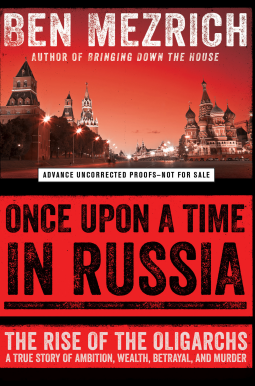Reviewed for NetGalley.
* * * * *
* * * * *
It recently came to my attention, having read quite a number of Russian classics over the years, that they all seem to be “gray.” Following that thought, I discovered that ofttimes for me, mysteries or thrillers are “red,” books of encouragement are “blue,” fantasies register “orange,” and so on. However, stories of long ago Russian history and of the days of the Soviet Union are “gray.” The people seem sad, lost, hopeless, forlorn—leaving me feeling “gray.” Once Upon a Time in Russia, by Ben Mezrich, however, did not fit that mold, perhaps because its story is set in more modern times. A tale of the rise of the wealthy capitalists in Russia in the 1990s, it primarily follows Boris Berezovsky, an entrepreneur whose first business was in automobile sales. Using the new markets, and given the government’s dispensing of assets for pennies on the dollar (so as to raise ready cash), Berezovsky and a handful of others (dubbed the “oligarchs”) become immensely wealthy. (In this regard, perhaps this story is overall, “green.”) With their riches comes the power to make and to break those seeking public office, which in turn increases the oligarchs’ treasures. Over time, Berezovsky discovers the price of helping to bring one, Vladamir Putin, to power, only to find himself on the outside at a later date.
Ben Mezrich traces Berezovsky’s story, presenting along the way, mysteries of those who fled the “new” Russian, only to be found dead later, to painful Polonium poisoning, or from a simple gunshot. Told in a story form, with re-created likely dialogue, Mezrich’s Once Upon a Time in Russian moves quickly, providing insight into the lives of the powerful, the rich and the famous. The price of corruption and cronyism are made clear, as are the consequences of a powerful government not constrained by the traditions of honesty and of service to the masses, and of a media serving not the everyday man, but rather, an ideology. In this way, Once Upon a Time in Russia serves as both an historical rendition of Russia’s recent days, and as a warning to those whose first allegiance is not to openness, but to a particular political orientation.
Ben Mezrich traces Berezovsky’s story, presenting along the way, mysteries of those who fled the “new” Russian, only to be found dead later, to painful Polonium poisoning, or from a simple gunshot. Told in a story form, with re-created likely dialogue, Mezrich’s Once Upon a Time in Russian moves quickly, providing insight into the lives of the powerful, the rich and the famous. The price of corruption and cronyism are made clear, as are the consequences of a powerful government not constrained by the traditions of honesty and of service to the masses, and of a media serving not the everyday man, but rather, an ideology. In this way, Once Upon a Time in Russia serves as both an historical rendition of Russia’s recent days, and as a warning to those whose first allegiance is not to openness, but to a particular political orientation.



